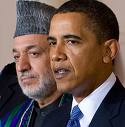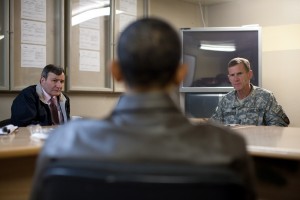Wednesday
Mar312010
UPDATED Afghanistan Eyeball-to-Eyeball: Obama Administration v. Karzai
 Wednesday, March 31, 2010 at 18:01
Wednesday, March 31, 2010 at 18:01  UPDATED 1740 GMT: "He's an SOB, but He's Our SOB." Spencer Ackerman picks out the most striking passage --- compromise or climbdown? --- from the US/NATO acceptance of the authority of Ahmed Wali Karzai:
UPDATED 1740 GMT: "He's an SOB, but He's Our SOB." Spencer Ackerman picks out the most striking passage --- compromise or climbdown? --- from the US/NATO acceptance of the authority of Ahmed Wali Karzai:"He is also one of the area’s biggest entrepreneurs, with business and real estate ventures across southern Afghanistan. 'One thing, he is a successful businessman,' the senior NATO official said. 'He can create jobs.'"
UPDATED 0745 GMT: Compromise, Climbdown, or Both? Another article by Dexter Filkins in The New York Times offers the latest in political manoeuvres and signals: "Despite Doubt, Karzai Brother Retains Power".
The gist of the piece is that the US and NATO want Ahmed Wali Karzai removed from Afghanistan's second city, Kandahar, where a US-led military offensive is soon expected but that they cannot force this:
“My recommendation was, remove him,” a senior NATO officer said this week, speaking on the condition of anonymity. “But for President Karzai, he’s looking at his brother, an elected official, and nobody has come to him with pictures of his brother loading heroin into a truck.”
So the spin now is that Ahmed Karzai, who has been on the CIA payroll for many years despite his alleged connections with drug distribution and insurgent movements, will now be used "to help persuade Taliban fighters to give up".
Afghanistan Special: Mr Obama’s Wild Ride — Why?
Finish the sentence: "Can't live with him...."
---
Remember how on Monday, as we were trying to sort out the Obama flying visit to Afghanistan, we concluded, "There is no more political space if Karzai continues to be a corruption/drug/ mismanagement/backroom-dealing problem."
Well, check out the spin, as both Americans and Afghans try to frame the outcome of the Obama encounter with Afghan President Hamid Karzai in Tuesday's article by Dexter Filkins and Mark Landler in The New York Times:
This month, with President Hamid Karzai looking ahead to a visit to the White House, he received a terse note from aides to President Obama: Your invitation has been revoked.
The reason, according to American officials, was Mr. Karzai’s announcement that he was emasculating an independent panel that had discovered widespread fraud in Mr. Karzai’s re-election last year.
Incensed, Mr. Karzai extended an invitation of his own — to Mahmoud Ahmadinejad, the Iranian president, who flew to Kabul and delivered a fiery anti-American speech inside Afghanistan’s presidential palace.
“Karzai was enraged,” said an Afghan with knowledge of the events, who spoke on the condition of anonymity because of the delicacy of the issue. “He invited Ahmadinejad to spite the Americans.”
The dispute was smoothed over only this week, when Mr. Obama flew to Kabul for a surprise dinner with Mr. Karzai. White House officials emphasized that the most important purpose of Mr. Obama’s trip to Afghanistan was to visit American troops there.
But the red carpet treatment of Mr. Ahmadinejad is just one example of how Mr. Karzai is putting distance between himself and his American sponsors, prominent Afghans and American officials here said. Even as Mr. Obama pours tens of thousands of additional American troops into the country to help defend Mr. Karzai’s government, Mr. Karzai now often voices the view that his interests and the United States’ no longer coincide.
Let's decode those opening paragraphs....
US Side: Karzai has been a naughty boy. We had to slap him down with the non-invite to Washington. (And, if you go by Monday's spin, President Obama went a step further with the warning to Karzai in their 20 to 30-minute meeting: No More Corruption.)
Afghan Side: You're trying to slap Karzai down? Didn't work.
The Times piece is laden with this conflict. Their chief US source, "a senior official", spoke in serious tones, “We’re trying to find this balance of keeping pressure on him, without setting up bluffs that can be called. We’re coming to terms with dealing with the Karzai we have.” Filkins and Landler add, however --- presumably reflecting the American officials --- "Mr. Karzai has resisted all but the most feeble gestures" in fighting graft.
Nothing new in that theme, however. Go back to Hillary Clinton's effort a year ago to clip Karzai with the warning that the Obama Administration would not accept continued failure in governance; if it continued, the US would be looking towards a more effective Government. (Newsflash: all that Washington pressure ended in a Karzai win in a suspect election.)
No, what distinguishes this article are the Afghan sources. Consider this picture:
In January, Mr. Karzai invited about two dozen prominent Afghan media and business figures to a lunch at the palace. At the lunch, he expressed a deep cynicism about America’s motives, and of the burden he bears in trying to keep the United States at bay.
“He has developed a complete theory of American power,” said an Afghan who attended the lunch and who spoke on the condition of anonymity for fear of retribution. “He believes that America is trying to dominate the region, and that he is the only one who can stand up to them.”
Mr. Karzai said that, left alone, he could strike a deal with the Taliban, but that the United States refuses to allow him. The American goal, he said, was to keep the Afghan conflict going, and thereby allow American troops to stay in the country.
The description of the lunch was largely affirmed by two other Afghans who attended and who also declined to be identified. The person who described the meeting said some of the participants urged Mr. Karzai to reconsider his views and his plans to be more assertive with the United States. “We are a poor country,” he said. “We are depending on the United States.”
There are two theories racing amongst US observers of Afghanistan. One is that the sources are Karzai allies who are putting out the President's message that he is not bowing to Washington. The other is that the sources are not part of Karzai's inner circle and are talking to US reporters because they are worried the President will alienate the Obama Administration once and for all, leaving Kabul to face the insurgent threat on its own.
Pick either and the central message is still the same. Karzai is confident enough and angry enough (and arrogant enough?) that he is not necessarily going to carry out the repentance that was supposedly demanded by Obama on Sunday. On the eve of the reported US offensive to break the insurgency in Kandahar, he is going to complete the phrase for Washington, "Can't live with him....
....Can't live without him."




